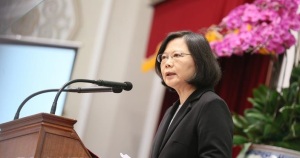nsnbc : Taiwanese President Tsai Ing-wen, on Friday, urged Beijing to correctly understand the meaning of last year’s presidential election and lean to respect the public opinion in Taiwan as the people support greater Taiwanese independence from the People’s Republic of China.
 President Tsai Ing-wen also said Beijing ought to respect the goodwill that the people of Taiwan repeatedly had shown over the past year. Tsai, who led her pro-independence Democratic Progressive Party back to power with a vote share of 56 percent in the Jan. 16, 2016, defeating her main rival Eric Chu of the the then-ruling Kuomintang, who garnered 31 percent stressed “This is a new era, because the Taiwanese people say so.”
President Tsai Ing-wen also said Beijing ought to respect the goodwill that the people of Taiwan repeatedly had shown over the past year. Tsai, who led her pro-independence Democratic Progressive Party back to power with a vote share of 56 percent in the Jan. 16, 2016, defeating her main rival Eric Chu of the the then-ruling Kuomintang, who garnered 31 percent stressed “This is a new era, because the Taiwanese people say so.”
Speaking at a meeting with a delegation of overseas Chinese media representatives on the eve of her first anniversary in office she said “The old questions should be let go to give way to new ones. The new issue is how the leaders of the two sides of the Taiwan Strait can jointly maintain cross-strait peace and prosperity.” Tsai reiterated that maintaining the status quo of cross-strait relations is the policy followed by her administration and that the commitments she has made in this regard remain unchanged.
Following her election victory last year, Beijing repeatedly expressed that it is dissatisfied with the fact that Tsai refuses to explicitly recognize the “1992 consensus,” which essentially implies that China and Taiwan are part of “one China,” unlike her predecessor Ma Ying-jeou of the KMT. In her inauguration speech, Tsai only went so far as to say that she respects the historic fact that the cross-strait talks took place and that some understandings were reached.
Beijing acted somewhat hysterically when then president elect Donald Trump, shortly after his election, broke Beijing’s policy that critics like to describe with “Beijing’s one China shop fits all Chinese policy” and accepted a courtesy call from Tsai. Some noted that the Republican party U.S. president – note that the party’s symbol is an elephant – had behaved like an elephant that came crushing into Beijing’s “one China porcelain shop”.
In what is seen as a way to pressure Tsai to comply, the People’s Republic of China has suspended dialogue with Taiwan and has withdrawn its endorsement of Taiwan’s participation in the World Health Assembly as an observer and in the International Civil Aviation Organization. In her statement on Friday Tsai outlined the progress of her promises to transform Taiwan’s economic structure, improve Taiwan’s social security network, uphold social justice and fairness, and promote the country’s foreign relations.
She also said that on economic transformation, plans to promote “five plus two” innovative industries are underway, and the government has also introduced a “forward-looking infrastructure development plan”. On social security, the “long-term care program 2.0″ has been launched, and efforts to amend laws crucial for pension reform have entered their final stage in the Legislative Yuan, she said.
On social justice and fairness, a committee has been set up under the Presidential Office to promote transitional justice for indigenous people, and the government is currently organizing a national conference on judicial reform, according to the president. Also, efforts to recover assets improperly obtained by the KMT and to declassify files from the authoritarian era have produced results, she said.
Commenting on foreign relations, Tsai said her two visits to Central and South America have helped strengthen Taiwan’s relations with its diplomatic allies in that region. Taiwan’s relations with Japan have also been moving forward, as seen in the renaming of the semi-official Association of East Asian Relations as the Association of Taiwan-Japan Relations.
Over the past year, visitors from Southeast Asia have seen a significant increase, a sign that the government’s New Southbound Policy is showing results, she said. The president said that public dissatisfaction with her performance, as seen in surveys conducted recently, is “a price that must be paid” for promoting reforms. “I chose to push for the most difficult reforms in my first term and my first year in office. None of my predecessors would have done such a thing,” said Tsai. She added that she will not give up on her endeavor, because those reforms are what the past several presidents wanted to achieve but could not.
Over the past year, her government’s main focus has been converting its ideals and values into substantive policy blueprints and plans, she said, adding that the most important goal for the coming year is to implement the plans.
F/AL – nsnbc 19.05.2017
Source Article from https://nsnbc.me/2017/05/19/83943/
Related posts:
Views: 0
 RSS Feed
RSS Feed

















 May 20th, 2017
May 20th, 2017  Awake Goy
Awake Goy 











 Posted in
Posted in  Tags:
Tags: 
















